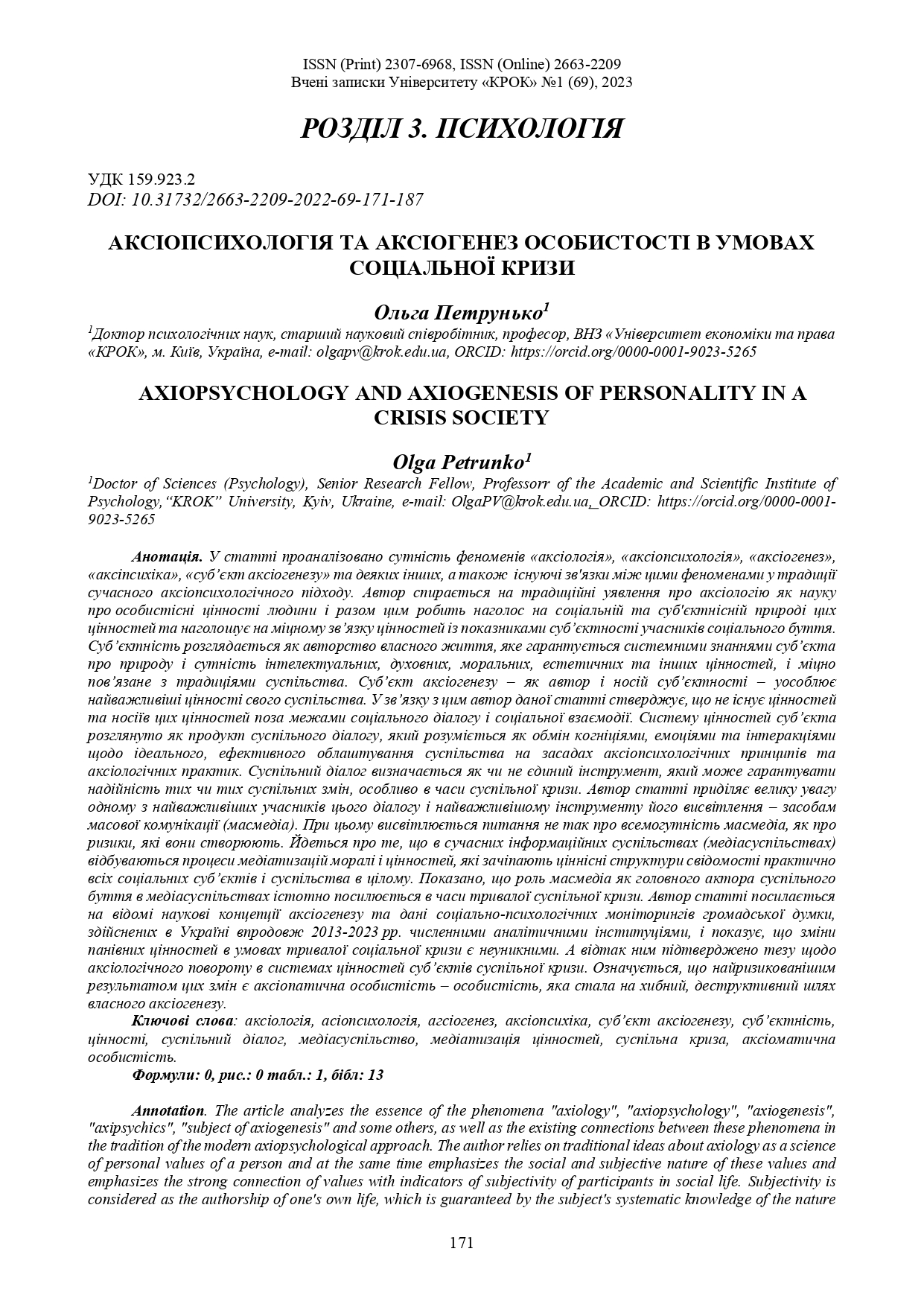AXIOPSYCHOLOGY AND AXIOGENESIS OF PERSONALITY IN A CRISIS SOCIETY
DOI:
https://doi.org/10.31732/2663-2209-2022-69-171-187Keywords:
axiology, asiopsychology, axiogenesis, axiopsychics, subject of axiogenesis, subjectivity, values, public dialogue, media society, mediatization of values, social crisis, axiopathic personalityAbstract
The article analyzes the essence of the phenomena "axiology", "axiopsychology", "axiogenesis", "axipsychics", "subject of axiogenesis" and some others, as well as the existing connections between these phenomena in the tradition of the modern axiopsychological approach. The author relies on traditional ideas about axiology as a science of personal values of a person and at the same time emphasizes the social and subjective nature of these values and emphasizes the strong connection of values with indicators of subjectivity of participants in social life. Subjectivity is considered as the authorship of one's own life, which is guaranteed by the subject's systematic knowledge of the nature and essence of intellectual, spiritual, moral, aesthetic and other values, and is strongly connected with the traditions of society. The subject of axiogenesis – as the author and bearer of subjectivity – personifies the most important values of his society. In this regard, the author of this article claims that there are no values and carriers of these values outside the boundaries of social dialogue and social interaction. The value system of the subject is considered as a product of social dialogue, which is understood as an exchange of cognitions, emotions and interactions regarding the ideal, effective arrangement of society on the basis of axiological principles and axiological practices. Public dialogue is defined as almost the only tool that can guarantee the reliability of certain social changes, especially in times of social crisis. The author of the article pays great attention to one of the most important participants in this dialogue and the most important tool for its coverage - means of mass communication (mass media). At the same time, the question is highlighted not so much about the omnipotence of the mass media as about the risks they create. t is about the fact that in modern information societies (media societies) there are processes of mediatization of morality and values, which affect the value structures of consciousness of almost all social subjects and society as a whole. It is shown that the role of mass media as the main actor of social life in media societies is significantly strengthened in times of prolonged social crisis. The author of the article refers to the well-known scientific concepts of axiogenesis and the data of socio-psychological monitoring of public opinion carried out in Ukraine during 2013-2023 by numerous analytical institutions, and shows that changes in dominant values in conditions of a prolonged social crisis are inevitable. And therefore, it confirmed the thesis regarding the axiological turn in the value systems of the subjects of the social crisis. It turns out that the riskiest result of these changes is an axiopathic personality - a personality that has embarked on a false, destructive path of its own axiogenesis.
Downloads
References
Кримський С.Б. Практично-духовне освоєння світу. Філософський енциклопедичний словник. Київ : Інститут філософії імені Григорія Сковороди НАН України : Абрис, 2002. 742 с.
Карпенко З.С. Аксіологічна психологія особистості. Монографія. Івано-Франківськ: ДВНЗ «Прикарпатський національний університет імені Василя Стефаника», 2018. 720 с.
Радчук Г.К. Аксіопсихологія вищої школи. Монографія. Тернопіль: ТНПУ ім. В. Гнатюка, 2014. 380 с.
Петрунько, О.В. & Плющ, О.М. (2021). Перспективи застосування екологічного підходу в сучасних психологічних дослідженнях. Вчені записки Університету «КРОК», 4 (64), 205-216.
Музика О.Л. Аксіогенез особистості і розвиток обдарованості: теоретична модель і підходи до дослідження // Актуальні проблеми психології. Психологія обдарованості, 14 (6). С. 60-76.
Плющ О.М. Соціально-психологічні механізми інформаційного впливу в постіндустріальному суспільстві : дис. ... доктора психолог. наук : 19.00.05. Київ : Інститут соціальної та політичної психології НАПН України, 2018. 400 с.
Медіа-культура особистості: соціально-психологічний підхід: навчальний посібник / за ред. Л.А. Найдьонової, О.Т. Баришпольця. К.: Міленіум, 2010.
Петрунько О.В. Діти і медіа: соціалізація дитини в агресивному медіасередовищі. Ніжин, 2011. 480 с.
Allport G.W. Mental health: a generic attitude. 1964. № 4. P. 7-21.
Rokeach M. Beliefs, Attitudes and Values. San Francisko, 1972. 214 p.
Потятиник Б., Лозинський М. Патогенний текст. Львів: Місіонер, 1996. 296 с
Інформаційний вплив: теорія і практика прогнозування / за ред. П.Д. Фролова; Національна акад. пед. наук України, Ін-т соц. та політ. психології. К.: Міленіум, 2011. 304 с.
Durkheim É. La educación moral. Print Book, Spanish, 2002. 296 p.

Downloads
Published
How to Cite
Issue
Section
License

This work is licensed under a Creative Commons Attribution-NonCommercial 4.0 International License.

